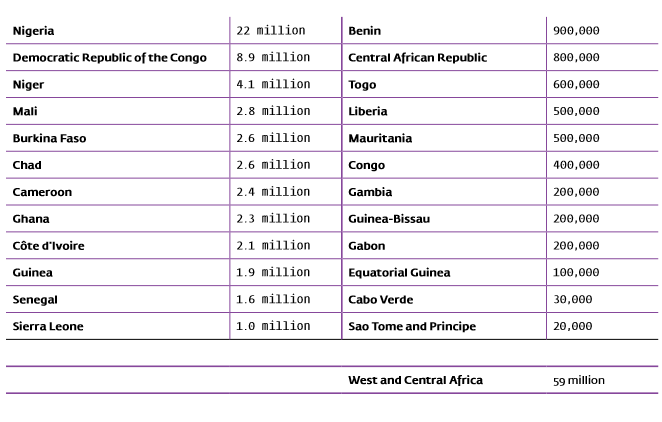What is Child Marriage
Any formal or informal union between a child under the age of 18 and an adult or another child is referred to as child marriage. The vast majority of child marriages involve a girl and a man and are motivated by gender inequality.
Child marriage has been common throughout history and continues to be so today, especially in developing countries like Togo, Liberia, Central Africa, Mauritius, and Congo, as well as in developed countries. However, this does not change the fact that it is a violation of human rights.
According to UNICEF, approximately one-third of the world’s female population marries as a child, and statistics show that approximately five million girls marry under the age of fifteen every year, with Central Africa having the second highest rate of child marriage in the world, with a whopping 29 percent of girls marrying before the age of sixteen and 68 percent marrying before the age of eighteen.

Despite the fact that there is a federal child rights act and laws prohibiting marriage before the age of 18, regions with Islamic judicial systems have failed to adopt both the federal law and the minimum age for marriage. Some southern states that have taken this stance have not taken the necessary steps to implement it.
Girls get married while they should be in school, and end up performing the adult role at such a young age, interrupting their education and capacity to contribute to the country, only to become complete housewives with 96 percent dissatisfied with the marriage action.
This is clearly child abuse, as tiny children are forced to sleep with old cruel adults, which is traditional and culturally acceptable in rural regions, and the worst part is that their families typically plan their marriages for them without giving them a say in when or with whom they marry.
The emotional impact of child marriage can last a lifetime for any youngster who has been through it and if not addressed, child marriage can have a wide range of negative consequences for the country’s growth and economic stability.
Men who marry young girls frequently claim that their actions are motivated by being disappointed by older ladies and that they can instruct the young ones according to their own preferences.
Many fathers who send their children off to marriage argue that doing so reduces the possibility of sexual abuse against the kid by armed men during times of crises and that her husband will look after her.
This is not the true for the youngsters, as evidenced by the females interviewed who stated that they attempted to flee their forced marriages. According to human rights watch, One of them, who married at 14, had run away six times in three years, but was returned to her husband each time by family members.
Causes of Child Marriage
Poverty
Poverty is likely the most critical factor that leads parents to give their children away in marriage at a young age. Child marriage is common in areas where parents are unaware of childbirth control measures, resulting in the birth of far too many children that they can’t afford to feed and educate. When the financial burden becomes too much for them, they give their children away in marriage as a way to ease and offload the financial tension on them, claiming that the child’s financial needs will be shifted to her husband.
Abduction
While many child marriages are performed with the approval of the parents, not all child marriages are planned. In rural areas, where people are less protected, a child may be abducted and forced to marry one of her abductors without the consent of her parents.
Repayment of Debt
Giving children in marriage has also been a way for some to pay off some or all of their debts to the groom’s family, which could include debts owed by the grandparents, having a negative impact on the children.
Culture and Tradition
Practices and traditions can also drive child marriage. Marriage is merely considered as a period of femininity in various cultures.
When a girl’s period begins, she is considered an adult, and the expected next phases in her life are marriage and childbirth. Younger girls are believed to be more easily corrected, making them easier to mold into obedient wives.
Child marriage is a political issue in several regions. Partnerships are established to enhance or establish bonds amongst tribal groups or communities. It’s about family honor in some other places. Preventing the embarrassment of having an unmarried child or a child born outside marriage.
In some other cultures, girls who lost their virginity are regarded as tainted or totally unfit for marriage. Parents may therefore organize for their daughter to marry at a young age to reduce the risk of losing her virginity.
Gender Inequalities
When a girl child is viewed as a mere housewife, funding her education appears to be a waste of resources, and girls who do not attend school are three times more likely to marry before the age of eighteen.
The Material benefits (Dowry)
The material benefits attached to giving out children in marriage in exchange for dowry or bride price are what motivates most people to participate in the practice. The additional benefit they will receive from giving our virgins as a wife is another reason why parents give their children out in marriage earlier than usual to avoid the risk of the child losing her virginity if she remains unmarried.
Effects of Child Marriage
From the perspectives of girls’ health (mental and physical), education, and social development, child marriage has long-term effects. These impacts continue much past adolescence and can even last a lifetime. Pregnancy and childbirth are one of the leading causes of death among girls aged 15 to 19 in poor nations. In Niger, which is thought to have the world’s highest rate of child marriage, around seventy five percent of girls marry before they turn eighteen.
Girl marriage takes away a girl’s youth and puts her life and health in danger. Girls who marry before they are 18 are more likely to face domestic violence and drop out of school. They have worse economic and health outcomes than their unmarried peers, which are passed down to their children.
Early marriage has long-term and profound effects on women. It restricts their ability to make their own life decisions, disrupts their studies, exposes them to violence and prejudice, and denies them full participation in economic, political, and social life. Here are some of the most common impacts of child marriage to both the parent and child.
Risk of Death During Childbirth
It is evident that immature children who marry young have a higher risk of dying during childbirth, and according to SavetheChildren, more than 22,000 girls die each year from pregnancy and childbirth as a result of child marriage.
High rate of Infant Mortality
Because of the inexperience of younger married girls, their children may receive inadequate care and suffer health problems as a result of their inability to provide medical care for their children. According to Uc San Diego Health also confirmed that countries with higher rates of child bride marriage have higher rates of maternal and infant mortality.
Higher Rate of Poverty Cycle
Raising a child in poverty is one of the reasons why they stay in poverty for the rest of their lives; they are hardwired to believe that living that way is the “normal” way of life, especially when they see everyone else in their town being raised in the same way. Uneducated girls who are married off at an early age are usually poor and have no financial education to offer their children, and those children grow up to perpetuate the cycle of poverty down to their own children as well.
Depression
Depression is always all over the face of girls who married young, having no power to choose when and who to marry is enough reason for depression, another reason why girls get depressed are domestic violence, poor living standards and/or the death of one of their children, many married girls are said to see their husbands’ houses as hell and attempt to escape, while some succeed, others are caught only to be returned to that same house.
High level of illiteracy
Married girls’ chances of going to school are minimal, and once they have children, they do not see the need to send them to school as well, regarding educating them as waste of resources, leading to a spiral of giving their children out to early marriage, and the potential contribution to the political and economic sectors of the country that those children could have made if they had gone to school is totally obliterated.
Health Issues
Despite the fact that many poor families see their girls marrying as a possible financial solution for their families, married females claim to have fallen even more into poverty following marriage. Men who have the money to pay their bride price wouldn’t have enough money to provide food, education, health care, and other basic necessities for their new family placing them at higher risk of having major health problems.
How to Stop Child Marriage
Although numerous groups have spoken out against child marriage over the years and made concrete actions to minimize the problem, there are still many societal policies that need to be implemented in order to dramatically reduce or eliminate the problem in Africa and abroad.
- Empowering parents and providing monthly incentives to less privileged children under the age of eighteen will go a long way toward encouraging parents to keep their children with them until they turn eighteen.
- More bodies should be established to provide comprehensive education on the effects of underage marriage on girls, children, and society.
- To combat child marriage, the government should enact laws and policies prohibiting child marriage, with penalties for violations.
- Educating parents on the value of girls’ education can also help to change their attitudes toward girls’ education for the better.
- Empowering males to maintain financial stability in order to limit the number of children given away in marriage due to poverty and debt.
- More bodies should be established to design and implement more measures and strategies to totally get rid of the abuse.






